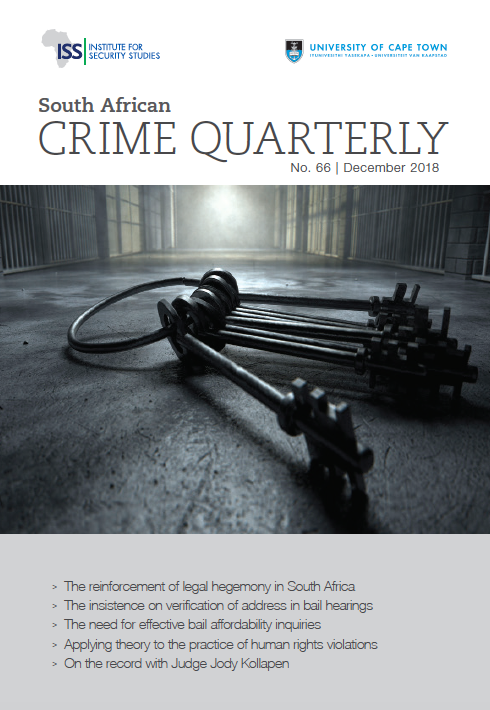On the record with Judge Jody Kollapen
DOI:
https://doi.org/10.17159/2413-3108/2018/i66a6242Abstract
With the revelations by Bosasa officials at the State Capture Enquiry, held in early 2019, laying bare the corrupt links between prisons, detention centres and border control, and high ranking political and government officials, the time is ripe to excavate the capitalist interests that fuel incarceration in this country. How did the prison industrial complex overtake the lofty principles that ushered in the South African democratic era? Judge Jody Kollapen is well-placed to speak to about the evolution of the South African prison from a colonial institute that served to criminalise and dominate 'natives', to its utility as instrument of state repression under apartheid, to its present manifestation in the democratic era. He has laboured at the coalface of apartheid crime and punishment through his work as an attorney in the Delmas Treason Trial, and for the Sharpeville Six, and also worked as a member of Lawyers for Human Rights, where he coordinated the 'Release Political Prisoners' programme, Importantly, Justice Kollapen had a ringside seat at the theatre of our transition from apartheid to democracy as he was part of the selection panel that chose the commissioners for the Truth and Reconciliation Commission (TRC). Many questions can be asked of the South African TRC including whether it was the best mechanism to deal with the past and whether it achieved reconciliation. What concerns us here is its impact on crime and punishment in the democratic era. If our transition was premised on restorative justice, then shouldn’t that be the guiding principle for the emerging democratic state? In line with this special edition’s focus on the impact of incarceration on the marginalized and vulnerable, Judge Kollapen shares some insights on how the prison has fared in democratic South Africa, and how imprisonment affects communities across the country. As an Acting Judge in the Constitutional Court, a practitioner with a long history of civic engagement, and someone who has thought and written about criminalization, human rights and prisons, Judge Kollapen helps us to think about what decolonization entails for prisons in South Africa.
Downloads
Downloads
Published
Issue
Section
License
Copyright (c) 2018 Author and Institute for Security Studies

This work is licensed under a Creative Commons Attribution 4.0 International License.
SACQ is licenced under a creative commons licence (CC BY) that allows others to distribute, remix, tweak, and build upon your work, even commercially, as long a they give appropriate credit, provide a link to the license, and indicate if changes were made. They may do so in any reasonable manner, but not in any way that suggests the licensor endorses you or your use.
Copyright for articles published is vested equally between the author/s, the Institute for Security Studies and the Centre of Criminology (UCT).




.png)